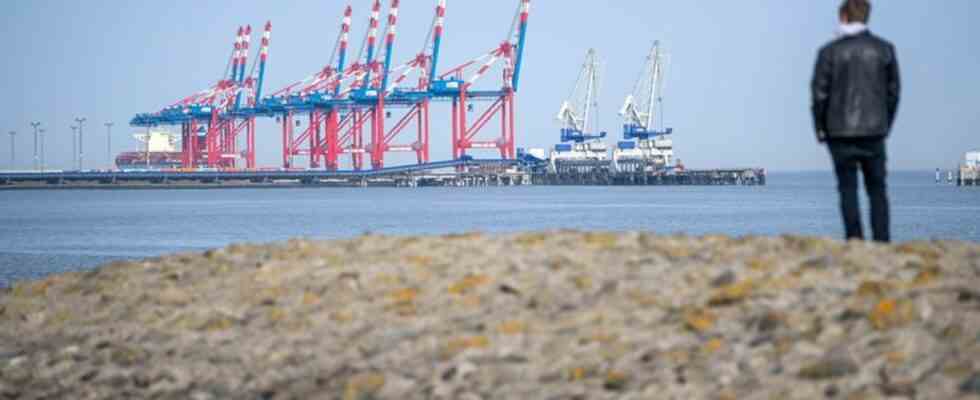global economy
IMF lowers global growth forecast due to Ukraine war
According to the IMF forecast, gross domestic product in Germany is only expected to grow by 2.1 percent – a downgrading of the January forecast by 1.7 percentage points. Photo: Sina Schuldt/dpa
© dpa-infocom GmbH
The war in Ukraine is slowing down the economic recovery from the pandemic. The IMF lowers its global growth forecast. The euro zone and Germany are particularly affected.
According to a new forecast, the global economy will grow much more slowly this year because of the war in Ukraine.
At the same time, the International Monetary Fund (IMF) expects a higher inflation rate for 2022, driven by higher energy and food prices, among other things. “The outlook for the global economy has suffered a severe setback, largely because of Russia’s invasion of Ukraine,” said IMF chief economist Pierre-Olivier Gourinchas.
1.7 percentage points less in Germany, 0.8 less worldwide
In its new forecast, the IMF only expects global growth of 3.6 percent this year. That is 0.8 percentage points less than assumed in January. The IMF expects growth in the euro zone to be 1.1 percentage points lower at 2.8 percent. In Germany, gross domestic product (GDP) is only expected to grow by 2.1 percent – a downgrade of the January forecast by a whopping 1.7 percentage points.
“This crisis is happening even though the global economy has not yet fully recovered from the pandemic,” Gourinchas said. Many states were already struggling with high inflation before the war. And the recent corona lockdowns in China could create new problems for global supply chains.
Lindner: “Warning signal”
Federal Finance Minister Christian Lindner described the IMF forecast as a “further warning signal”. “Low growth combined with rising inflation is a dangerous combination,” said the FDP politician. Economically, there is no “simple business as usual”. With a view to Germany, Lindner said that in view of the fragile economic situation, budgetary policy must be focused on and spending must be limited. “The state can only absorb the current shocks in the sense of a shock absorber, but not compensate for it permanently.”
The IMF had already lowered its global growth forecast by 0.5 percentage points to 4.4 percent in January as a result of the omicron wave of the corona pandemic. “Just as a lasting recovery from the pandemic was in sight, war broke out, potentially undoing recent advances,” Gourinchas told reporters.
Russia in deep recession
The latest reduction in the global economic forecast by 0.8 percentage points is mainly due to the poorer prospects for Russia and the European Union. Russia faces a deep recession as a result of harsh Western sanctions, accounting for around 0.3 percentage point of the downgrade. Another 0.2 percentage points are due to the gloomier prospects in Europe “because of the indirect effects of the war”. According to the IMF, only the economies of major commodity exporters currently have a more positive outlook in view of rising prices in 2022.
According to the IMF, the new economic forecast is associated with an unusually high degree of uncertainty. “Growth could slow further, while inflation could beat our forecasts — for example, if sanctions are extended to Russia’s energy exports,” Gourinchas said. Dangerous variants of the corona virus that undermine vaccination protection could also lead to lockdowns and production distortions.
High inflation persists
The inflation rate is expected to remain high longer than previously assumed, mainly because of the war. This year, the IMF is anticipating an inflation rate of 5.7 percent in the industrialized countries, i.e. 1.8 percentage points more than assumed in January. In emerging and developing countries, the inflation rate is expected to average 8.7 percent, an increase of 2.8 percentage points.
Commodity prices are an important driver of the inflation rate. “Russia is a major supplier of oil, gas and metals and, along with Ukraine, wheat and corn. A reduced supply of these commodities has pushed their prices up sharply,” explained Gourinchas. The IMF made it clear that the increase in petrol and food prices will primarily affect low-income households worldwide. The price increases “could also significantly increase the likelihood of social unrest in poorer countries,” it said. Aid organizations warn that countries in the Middle East and Africa in particular could be severely affected.
According to the IMF forecast, the Russian economy is likely to collapse by 8.5 percent this year, down 11.3 percentage points from January. Other forecasts, such as those of the World Bank, are anticipating an even deeper recession. The IMF expects a dramatic recession for Ukraine; the economy is said to shrink by 35 percent because of the war. However, given the ongoing fighting, economic forecasts for Ukraine are associated with a particularly high level of uncertainty.

